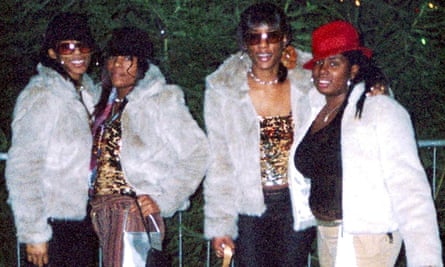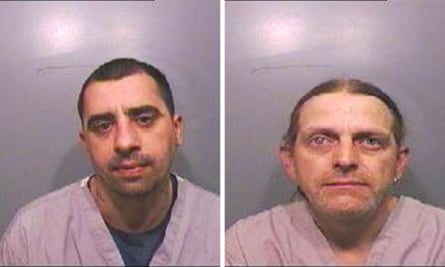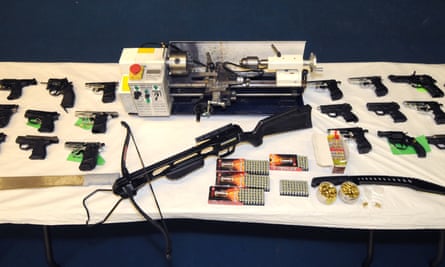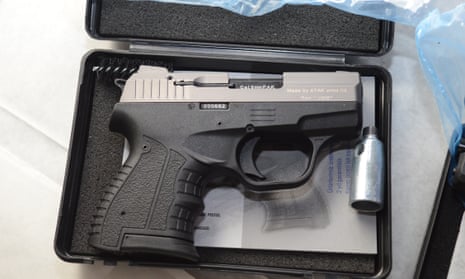On the outskirts of Hlučín, beside a sports bar and pizza joint, is a two-storey warehouse increasingly familiar to British criminals and police. Here, a short stroll from the rolling farmland of the eastern Czech Republic, is the portentously titled Bullet Project, owned by the local weapons supplier Balistas.
Visitors to the business’s website can acquire weaponry from crossbows to high-spec air rifles. The Zoraki automatic handgun, which can fire eight bullets a second, is proving popular with Britons.
In May 2017 Balistas sent a consignment of Zorakis by “fast parcel” courier to an address near the A421, south of Bedford. There, in a suburban garden shed, the blank-firing guns were converted to deadly weapons and sold to underworld figures.
What followed next would not only instigate urgent attempts from the Home Office to amend gun laws across Europe, but elicit concern among counterterrorism officials that such weapons could readily fall into the hands of extremists, be they far right or jihadist.
The newly modified Zorakis travelled far, and quickly, police sources told the Observer. Ballistics analysis traced them to Birmingham, Essex, London and Luton. An attempted murder, a drive-by shooting at a crowded fast-food restaurant and an audacious hit at a London shopping centre would ensue. A home in Romford was sprayed with bullets.
Much of the debate surrounding the UK’s rise in violent offences has concentrated on knife crime. Yet running quietly parallel to the discourse on reducing knife use, senior police officers warn that many of the metrics measuring firearms are moving the same way.
Recorded firearm offences in England and Wales rose nearly a quarter to 6,375 offences last year, while the number of people shot dead increased by a fifth. Ballistics intelligence has mapped the highest number of firearm discharge incidents for five years; the number of weapons seized suggests the volume of firearms on Britain’s streets is at its highest in almost a decade. One reason, say experts, is traceable to eastern Europe and outlets like the one next door to Hlučín’s sports bar.
One constant in the perpetually evolving ecosystem of crime is the gun itself. The more lethal the weapon, the higher its owner’s status, and the acquisition of a handgun that can fire rapidly is a shared ambition among violent criminals. “There’s a genuine status in the type of firearm as much as the firearm itself,” says Helen Poole, a firearms expert at Northampton University. The latest intelligence assessment estimates there are 750 organised crime groups and urban street gangs “involved with guns” in the UK. This despite the fact that the country has some of the world’s most stringent gun laws, which means it requires ingenuity to obtain potent guns, along with an eye for spotting new opportunities.

It was the attacks on the offices of the French satirical magazine Charlie Hebdo in 2015 that provided the starting point for the events that would lead to the import of the Zorakis into Bedford. Investigators tracing the guns that killed 12 people in Paris discovered they had been legally procured from a shop in Slovakia, deactivated and sold to resellers who passed them to terrorists. In July 2015 Slovakia’s government dramatically tightened its gun laws. British police say the development inadvertently created another threat.
Detective Inspector Justin Dipper, who is tracking the consignment of Zorakis in Bedford, said new firms merely sprung up in neighbouring countries such as the Czech Republic where it is legal to sell blank-firing models like the Zoraki as well as so-called Flobert guns. The latter are able to fire small 6mm rounds and can be lethal in their unmodified state.
Both are illegal to possess in the UK. Dipper, from Bedfordshire police’s serious and organised crime unit, said it was straightforward to convert a Zoraki into a deadly automatic weapon. “If you’re somewhere beyond O-level metalwork you’ll probably be able to do it in a couple of hours. Ultimately what we have are teenagers buying prohibited weapons for €100-plus, converting them into lethal barrelled weapons and then walking around the streets shooting people.
“You don’t need to be wholly sophisticated to do this, that’s the risk. This is clearly an evolution and we are constantly having to deal with the threat that these guns pose.”
On the Balistas website the UK is listed among countries eligible for shipping at €35. Several of the Zoraki guns are listed as sold out. The models imported to Bedford – which cost from €74.10 to €97.70 – are described as among the “most popular”. Dipper said they were so advanced that they effectively replace the MAC-10, the submachine gun that became notorious a decade ago.
The National Crime Agency’s strategic threat assessment also suggests the Slovakian crackdown motivated east European firms to sell guns that could be “minimally converted to fire standard bullets”. It mentions the Zoraki, noting these are “an emerging trend in the London area”.
Recently it became evident that organised crime groups had spotted the loophole. Between May 2017 and May 2018 the National Crime Agency identified the use of converted-blank or Flobert weapons in 99 crimes, including a murder.
The issue was how to stem their popularity before more gangs caught on. On 7 November, border officials, police and Europol investigators assembled on the first floor of the agency’s offices in Vauxhall, south London. Behind them, dominating a wall, was a huge map of eastern Europe. It was Britain’s first “day of action” against individuals who had bought illegal guns online from companies such as Balistas. “We’ve done background checks and intelligence updates to identify 60 individuals of whom 20 are high to medium risk and may have links to organised crime,” said James Coomber, the agency’s deputy firearms lead, as a wave of UK-wide raids began.

By 9.45pm police had recovered 21 firearms, including 12 handguns and a submachine gun, and 150 rounds of ammunition. Nine people had been arrested. Some were street-level drug dealers wanting a handgun for muscle. Some were armed robbers who needed arms. One person admitted selling on at least 12 guns. In Scotland someone bought 68 weapons and 1,500 rounds.
Yet even as the mounting tally of arrests was entered into a master spreadsheet, frustration was evident over the refusal of some Czech firearm companies to release their databases of customers.
A Europol source said: “We’ve got a big gap in the Czech Republic. We’re trying to build a picture, we’re trying to put more pressure on these countries. But the fact is we don’t know how many are being sold to the UK.”
During a visit to the Czech Republic earlier this year with Interpol, Dipper learnt that companies like Balistas were distributing hundreds of packages internationally every week.
When the Observer, posing as a potential customer, contacted the firm, it was told that hundreds of parcels had been sent to Britain with little problem.
The following day, in response to questions from the Observer, Marek Děngl of the Bullet Project released a statement saying they would stop selling blank guns and Floberts to the UK, possibly as early as this week. “Our main business is sporting shooting and we don’t want to damage our brand,” he said. Děngl revealed that UK police, with whom he said they “repeatedly shared” information, had also officially approached the company last Wednesday to stop exporting the controversial weapons.
For British police, the development prompted relief. Dipper said they had been trying to track down Balistas’s parcels and stop them, “but they sell such a variety of stuff you can’t say every parcel is a firearm. You might open one and it’d be combat clothing”.
Matthew Harwozinski, 29, never planned to order combat fatigues when he emailed Balistas from Bedford in April 2017. When detectives accessed his iPad and logged on to his account with the Czech outlet they saw he went straight for a shipment of Zorakis.
Analysis of six months’ activity on the account showed that Harwozinski bought dozens of the blank-firing handguns and more than 1,000 rounds of ammunition. His friend Ricky Garner, 48, who lived on the same street, converted them to fire live ammunition in his shed. Each converted firearm sold for up to £2,000 with an optional “running repairs” service. Once, police found the barrel of a firearm that had dropped off during a shooting. The same weapon was fired 10 days later.
In August, Harwozinski, who is British, was given a life sentence while Garner was jailed for 20 years and three months.

Yet their modified guns remain on the streets. “We estimate there are probably two dozen outstanding,” said Dipper. Tracking them down has become a priority. The Met recently found one in London. Last week police located another in Bedford.
On 21 September a house in Romford, Essex, was peppered with bullets that ballistics analysts traced to Harwozinski and Garner. On 18 June a Zoraki consistent with those supplied by the two men was recovered in the capital. Ten days earlier another was found in Mottingham, south London.
On 27 March bullets supplied by Garner and Harwozinski were found 170 miles away in Birmingham. Two months before that, a driver at Wood Green shopping centre in north London was shot. When police caught up with the victim he was carrying ammunition also linked to the Zorakis, indicating a gangland feud. In the preceding week guns and ammunition linked to the batch were discovered in Ilford, Essex.
The incidents continued. Days before Christmas last year shots were fired through two car windows in Tower Road, Luton. Hours later a bullet struck a McDonald’s restaurant in the same town. Weapons in both shootings were traced to Garner and Harwozinski.
Although no one was injured in either incident, a subsequent shooting two months later in Romford was described by police as attempted murder. Forensics experts determined that the unique casings and bullets at the scene again matched the weapons supplied by Garner and Harwozinski.
They also matched the bullets used in another shooting at the same McDonald’s in Luton weeks earlier. As police hunted down the remaining firearms, the conundrum was whether the consignment would yet prove fatal.
One of security officials’ greatest fears is an MTFA – a “marauding terrorist firearms attack”. An extremist carrying an automatic weapon targets a busy space with catastrophic results.
Some counterterrorism officials fear the automatic weapon in such a terrorist’s hands could turn out to be a blank-firing handgun imported from eastern Europe. A recent draft report, by the European parliament’s special committee on terrorism, states: “The threat of firearms being used in terrorist attacks remains, also due to an increase in converted blank-firing weapons available on the illicit weapons market.”
An area of keen focus is the opaque nexus that exists between organised criminals with access to firearms and extremists. Prison, say police, is an area of concern.
A recent Flemish Peace Institute investigation into Europe’s illegal firearms market and terrorists, using testimony from nine current and former high-ranking UK police officers, highlights the penal system as a place where criminals and extremists could discuss gun supply.
One police informant envisages a scenario where “imprisoned top-level criminals converting to Islam for better food and treatment perhaps meet individuals that are radicalised and seeing business opportunities”.
Last year’s Operation Dragonroot to disrupt the UK supply of illegal firearms to potential terrorists led to 642 firearms being seized and the arrest of 282 suspects.
The obvious worry is that the next Harwozinski and Garner may choose not to ask too many questions when selling converted guns. “Sometimes it’s just about money,” said Dipper, who also floats the possibility that extremists may send a frontman to seal the deal. “They purport to be a drug dealer but might be the ‘legitimate’ front of a more extreme organisation.
“There’s a worry about people becoming radicalised at home – but with the same keyboard they can import a handgun and, with a bit of metalwork, make that into a real gun.”
That some of Harwozinski and Garner’s ammunition washed up in the Midlands comes as no surprise: the gangland dynamics in England’s second city have become tangled of late. Traditionally Birmingham was dominated by conflict between the Burger Bar Boys and the Johnson Crew, but old loyalties have fractured with the emergence of smaller ultra-violent gangs including the Frankley Killers and the 23 Drillas. All want to outdo the others in their capacity to mete out violence. Al of theml want guns.
So desperate is the hunt for firearms that Detective Inspector Al Teague, head of Birmingham’s organised crime and gangs unit, says that gang members risk firing weapons that might rip off their own limbs. “We’ve seen some very crude homemade firearms that could easily take your hand off when used.” The fear is that if one gang starts cheaply converting handguns from places like Balistas, others will follow. “Clearly there’s a channel to get these weapons into the country quite easily: we have seen an issue with east European weapons coming in,” says Teague.
Recently Europol and the National Crime Agency, backed by Ben Wallace, the security minister, have begun putting pressure on countries such as the Czech Republic to introduce the same gun laws as those in the UK. History suggests that changes to gun regulation tend to be “event driven” in that an attack or catastrophe precipitates legislative or political action. The Home Office, fully briefed over the potential threat from another outlet like Balistas, hopes it can beat the clock.
